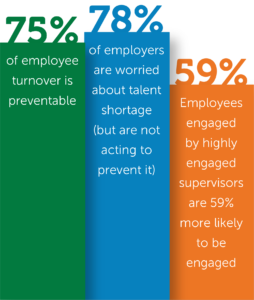Managers and supervisors can have the single largest impact on your organization. A good or bad manager or supervisor affects employee performance, productivity, efficiency and turnover, and the overall health of the organization.
A survey conducted by HR Dive found that 75% of employee turnover is preventable (through the direct supervisor). And 78% of employers are worried about a talent shortage but do not take actions, like adding supervisor training, to prevent turnover. They also found employees supervised by highly engaged supervisors are 59% more likely to be engaged.
In any company, the supervisor is basically the representative of the employer. They have to fully understand all laws and policies in order to be sure that violations will be avoided. Then, it is necessary to know how to deal with concerns and complaints. Supervisors have the huge responsibility of making sure that issues that pop up will be resolved before it affects retention or goes to legal action. The work also includes making employees comfortable with tasks and responsibilities.
The benefits of putting trained, capable supervisors in place cannot be overstated. The core skills that new supervisors need in order to boost employee engagement, emotional commitment, and work output are:
- Communication skills

- Setting clear expectations
- Giving feedback to help employees
- Delegating effectively
- Ensuring all team members feel valued and have a voice
- Making decisions and solving problems in transparent and predictable ways
- Understanding coaching vs. managing
- Conducting team and one-on-one meetings
- Leading change proactively
- Demonstrating positive leadership behaviors
Most of these skills are not learned or instinctively picked up without formal training. When individuals are promoted into supervisory roles without training, they are more likely to rely on policies and authority. This alienates employees and negatively impacts workplace morale.
— Read more in SWEAP Connections 2021 Workforce Impacts and Trends

